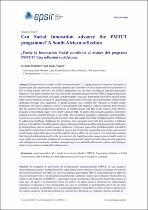| dc.contributor.author | Mdleleni, Lwando | |
| dc.contributor.author | Velapi, Linda | |
| dc.date.accessioned | 2022-09-20T09:55:27Z | |
| dc.date.available | 2022-09-20T09:55:27Z | |
| dc.date.issued | 2022 | |
| dc.identifier.citation | Mdleleni, L., & Velapi, L. (2022). Can social innovation advance the PMTCT programme? A South African reflection. European Public and Social Innovation Review, 7(1), 43-56. 10.31637/epsir.22-1.4 | en_US |
| dc.identifier.issn | 2529-9824 | |
| dc.identifier.uri | 10.31637/epsir.22-1.4 | |
| dc.identifier.uri | http://hdl.handle.net/10566/7928 | |
| dc.description.abstract | The prevention of mother to child transmission (PMTCT) programme is an initiative developed to enable health care practitioners to provide essential care to mothers in order to prevent the transmission of HIV to their infants.However,the PMTCT programme has not been reaching its intended prevention objectives. This paper identifies the social issues that elucidate the gap between PMTCT program goals and the role that Social Innovation could play in improving the status quo.Supporting Social Innovationin health helps reduce infectious diseases by empowering communities to become active participants in their health challenges through local adaptation of global strategies that facilitate the reduction of health system limitations.The article combines a review of the literature with empirical evidence extracted from research that has analyzed the postpartum experiences of mothers living with HIV in the context of the PMTCT program in Khayelitsha, Cape Town, South Africa in 2021. | en_US |
| dc.language.iso | en | en_US |
| dc.publisher | Sinnergiak Social Innovation | en_US |
| dc.subject | Social innovation | en_US |
| dc.subject | Health care practitioners | en_US |
| dc.subject | Public health | en_US |
| dc.subject | HIV | en_US |
| dc.subject | South Africa | en_US |
| dc.title | Can social innovation advance the PMTCT programme? A South African reflection | en_US |
| dc.type | Article | en_US |

